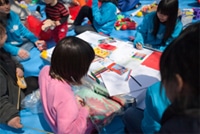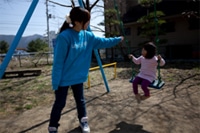



[TOKYO, Japan, 30 April 2011]
Since the Great East Japan Earthquake, the Japan Committee for UNICEF (JCU) has focused on assistance activities in the area of child protection by extending psychological care and providing assistance for orphaned children. Child protection is an essential part of realizing “Child Friendly Reconstruction” and is a pillar of JCU’s assistance activities.
Today, we will report on the progress of activities being conducted in the area of child protection.
 |
 |
|
| © Japan Committee for UNICEF/2011/Grehan | © Japan Committee for UNICEF/2011/ Grehan |
As concerns swell over the negative psychological impacts of the Great East Japan Earthquake on children, JCU has concentrated efforts on providing psychological care since the earthquake. The earthquake and tsunami were terrible experiences for children in the disaster area, and to make matters worse these children continue to live in abnormal conditions in shelters. In those shelters you will find children under intense psychological strain, having lost their families and friends.
Directly after the earthquake, JCU established Child Friendly Spaces in order to relieve the stresses of children and extend urgent care so that these experiences do not develop into psychological problems. In many instances, it has been possible to prevent worry and anxiety in children through playing.
Since the disaster UNICEF and JCU staff have acquired the cooperation of volunteers in operating Child Friendly Spaces at shelters and other areas. Moreover, since the beginning of April we have had teachers participate in workshops on providing psychological care through playing so that teachers would be equipped with these skills by the time younger children would be returning to kindergarten and preschool. There are also plans to provide these workshops for the parents of children that do not attend kindergartens or preschools. In this way we are making comprehensive efforts to implement psychosocial assistance for children at schools and at home.
 |
| © Japan Committee for UNICEF/2011/k.shindo |
JCU had provided assistance to children in vulnerable situations, such as orphans, children with disabilities and children from families that faced financial troubles even from before the disaster.
According to the Ministry of Health, Labour and Welfare, the number of children orphaned as a result of the Great East Japan Earthquake was 128 children as of 25 April. On 10 April, JCU released the “Outlook on alternative care for children orphaned as a result of the Great East Japan Earthquake”* and has been promoting and explaining that policy to related parties in various fields. This Outlook is based on various international treaties, including the Convention on the Rights of the Child, and is also in accordance with legal frameworks of the Government of Japan.
According to JCU’s local surveys, related individuals on the ground, including those at child consultation centers and operating foster family systems, have expressed preferences for policies similar to the abovementioned Outlook. These policies are consistent in asserting that new homes will be sought for children that have lost their parents as a result of this disaster by first pursuing the possibility of having said children living with relatives, and secondly with foster parents in the same region. JCU will continue to provide assistance for disaster victim orphans in light of future developments in the region.
In terms of support for children with disabilities, we are working to reconstruct the disability center in Miyagi Prefecture. We plan to help construct an environment where children with disabilities can enjoy themselves and live without fear. We have started by constructing both temporary and permanent centers for disabled children and providing needed equipment.
Moreover, in order to prevent the abuse of children we have presented a code of conduct to the Disaster Countermeasures Headquarters of each prefectural government for the various volunteers working in the disaster area. This code of conduct applies to all of the volunteers participating in activities implemented by JCU.
We are also supporting initiatives to ensure the safety of children and women, such as by distributing safety buzzers to children. We also plan to construct dressing rooms at the shelters for girls and women.
JCU strives to ensure “Child Friendly Reconstruction” that creates an even better environment for children in vulnerable situations, while also conducting local surveys and assessing the needs by talking with individuals related to the field of child protection.
*Outlook on alternative care for children orphaned as a result of the Great East Japan Earthquak (Japanese only)
| Receiving Prefecture |
Type of Emergency Supplies |
Arrival Date |
Quantity | Donating Company |
Comments |
|---|---|---|---|---|---|
| Miyagi | Water | 19 Mar. | 12,288 bottles |
VanaH Co., Ltd. | Two-liter plastic bottles |
| Fukushima | Water | 22 Mar. | 12,672 bottles |
VanaH Co., Ltd. | Two-liter plastic bottles |
| Miyagi | Underwear for boys and girls | 22 Mar. | 200,000 | ||
| Iwate | Underwear for boys and girls | 23 Mar. | 30,000 | ||
| Fukushima | Water | 23 Mar. | 4,680 bottles |
KIRIN MC DANONE WATERS Co., Ltd. | Two-liter plastic bottles |
| Miyagi | Children’s shoes | 23 Mar. | 10,000 pairs |
||
| Miyagi | Children’s diapers | 24 Mar. | 80 packs | P&G Japan | |
| Iwate | Children’s underwear | 24 Mar. | 9,700 | ||
| Fukushima | Water | 24 Mar. | 12,288 bottles |
VanaH Co., Ltd. | Two-liter plastic bottles |
| Iwate | Shoes | 26 Mar | 1,404 pairs | Achilles Corporation | |
| Iwate | Underwear for boys and girls | 27 Mar. | 28,266 | ||
| Iwate | Boots | 27 Mar. | 7,462 pairs | ||
| Iwate | Wipes | 28 Mar. | 1,200 | P&G Japan | For babies |
| Miyagi | Recreation kits Early Childhood Development kits |
2 Apr. | 50 of each | Procured from the UNICEF Supply Division | |
| Iwate | Recreation kits Early Childhood Development kits |
2 Apr. | 50 of each | Procured from the UNICEF Supply Division | |
| Miyagi | Book bags | 6 Apr. | 70 | Nihon New Bag Chain | |
| Iwate | Book bags | 6-7 Apr. | 340 | Seiban | |
| Miyagi | Schoolbags | 8 Apr. | 18,000 | Procured from the UNICEF Supply Division | |
| Iwate | Schoolbags | 8 Apr. | 18,000 | Procured from the UNICEF Supply Division | |
| Miyagi | Personal security buzzers (for crime prevention purposes) | 8 Apr. | 5,000 | ||
| Iwate | Personal security buzzers (for crime prevention purposes) | 8 Apr. | 5,000 | ||
| Miyagi | Minicar | 8 Apr. | 3 cars | ||
| Fukushima | Water | 11 Apr. | 1,536 bottles | VanaH Co., Ltd. | Two-liter plastic bottles |
| Miyagi | Replenishments for recreation kits | 12 Apr. | 60 sets | ||
| Miyagi | Miniature toy cars | 12 Apr. | Approx. 1,200 | TAKARA TOMY | |
| Sagamihara* | Water | 12 Apr. | 12,288 bottles | VanaH Co., Ltd. | Two-liter plastic bottles |
| Miyagi | Play mats | 13 Apr. | Two types; 80 of each type | IKEA | |
| Miyagi | Drawing sets | 13 Apr. | 60 sets | IKEA | |
| Iwate | Preschool-size chairs, tables and low tables | 14 Apr. | 75 chairs; 11 tables; 9 low tables | Donated to preschools, primary schools, junior high schools and high schools in the disaster area as well as their new locations | |
| Miyagi | Mopeds | 15 Apr. | 5 | ||
| Iwate | Notebooks and stationery sets for primary and junior high school students | 15. Apr. | 16,700 sets | ||
| Miyagi | 183 computers; 57 copiers and fax machines; 61 printers | 18-21 Apr. | Distributed to preschools, primary schools, junior high schools and high schools in the disaster area as well as their new locations | ||
| Fukushima | Movable blackboards | 21 Apr. | 10 | ||
| Fukushima | Temporary toilets | 21 Apr. | 20 |
Number of UNICEF Children’s Mini Libraries distributed: Approximately 250 (as of 28 April 2011)
*Areas receiving disaster victims.
*In certain cases some supplies may be taken from prefectural supply storage warehouses and distributed to shelters and disaster sites in other prefectures.
As of 9:00 a.m. on 28 April 2011 (compiled by the Information and Public Affairs Division).